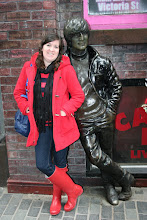You know
the old adage, the rule of three? Bad things happen in a trio. It’s been four
days since I had a functioning toilet, 14 days since I took a proper shower in
my flat, and 138 days since I had television. Today, things are going to turn
around at Flat 6 Roding House.
Since
October, when I moved into my new flat, the place has been cursed. Over the
same period of time, I’ve taken a hiatus from this blog and created a new one,
Foodflash.me, where I write about my culinary experiences in London. I’m not
returning to ‘A Canadian in London’ with the sole purpose of breaking the
curse. But part of me does hope it works.
My last
post on this blog was a couple of days before I moved into the new flat. For the most part, living here has been a grounding experience, and I mean that both
physically and emotionally. I’m finally living the non-nomadic life again,
sharing a flat with two fantastic roommates, and enjoying this shared
space, this shared kitchen, and a room to call my own.
But lately,
as the honeymoon period (that inevitable dawn that reveals reality) comes to an
end, life in the new flat has started to crumble around us. In the things that
really matter, everything is just as perfect as it was when we first moved in.
My new roomies and I are getting to know each other, and it’s been truly great.
But the logistics, the basics, the everyday essentials, have taken a bit of a
nosedive.
To be fair,
the 138 days without television hasn’t affected us too much. Basically, the
three of us are not technical-minded people, so the fact that we brought in an
old TV and failingly attempted to connect it to the aerial hasn’t been too much
of a drag. I miss the BBC, but I can’t make sense of the digital box, the
male-to-female connections or the numerous cords leading into the wall and out
to nowhere. The TV repairman who came in last week claimed our aerial
connection is good. I bought a universal remote to set the damn thing up, but
there is still no signal on our television.
So just as
our landlord, our estate agent and the property management team (I know, why so
many people to manage this little flat?) were bombarded by our numerous
requests to fix the TV, fate would have it that so many, rather more
imperative, aspects of our home began to fall apart.
Almost two
weeks ago, after suffering through 24 hours sans water (no sign of it in the
sinks, the shower or the toilet), the shower suddenly started bleeding out. I
don’t believe it’s related to the water outage, just an unlucky coincidence.
But it seems the cord that connects our tap to the showerhead is leaking water,
and thus the few drops that make the trip through the cord to spill out from
the head are pathetic. The time to take a shower has doubled, and I usually end
up rinsing shampoo out of my hair by kneeling under a running tap, where the
water is still plentiful. Most of the time, I just shower at my local pool
instead.
We have a
call in to fix the shower. The appropriate parties have been notified. But,
since our landlord/estate agent/property managers are very close to useless, we
have been waiting for 14 days. I’ve been assured that, before 4pm this
afternoon, the cavalry is coming.
But
meanwhile, and this is the third curse, the toilet has decided to stop working.
Now, I do love escaping into television, but I have the Internet on my laptop
and I can survive without British broadcasting. I like to be clean, but (let’s
face it) I can live with just a few drips of water. Where I do draw the line is four
days without a toilet that flushes. It’s inhumane. I grew up with cottages,
with camping, with outhouses. If I have to take it outside, and just use what
I’ve got, I will do it. But, in central London, these options are not
plentiful. So I wait.
Thank god
the plumber is coming to look at the shower this afternoon. He hasn’t been
notified yet of the secondary job, but you can bet he’ll hear about it when he
gets here. And the TV? Well, I’ll experiment with it for a few more days, but
you can also bet that the TV repairman is going to hear from the frustrated Canadian
girl at Flat 6 Roding House.
Life looks better when I'm escaping into my food blog. I eat out, I react to a food issue, I rant
about some chef whose food I like (or don’t). But life (basically, living) and
managing a flat again, especially in London, where nothing is ever easy, is a
real challenge. And I just wanted to convey that, to let you know it’s not all
foie gras, medium-rare steaks and duck confit. It’s also broken televisions, dripping
showerheads and plugged toilets. Life is grand.

